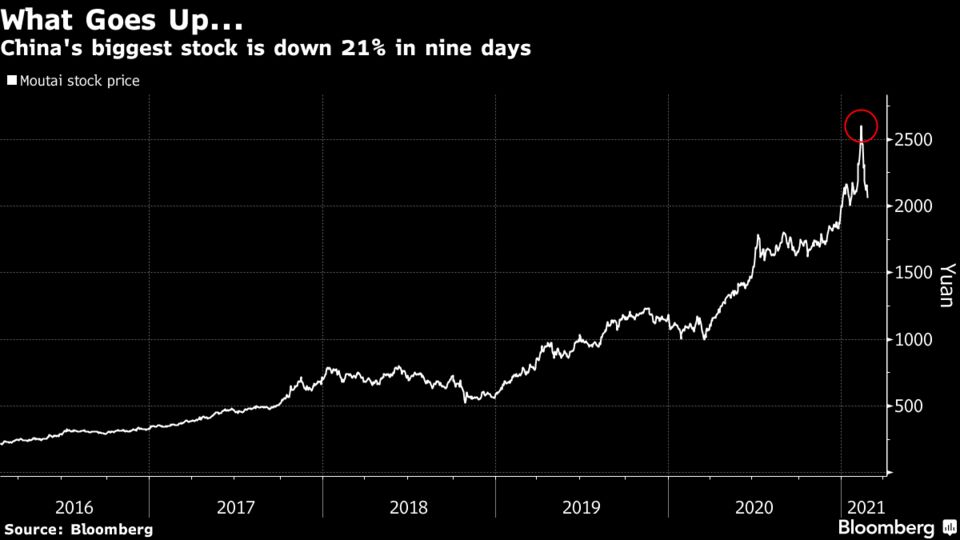BEIJING BANKRUPTCY BECKONS : How is that for alliteration.
China’s Focus on Bubble Risks Is a Warning Sign for Stock Market
- CSI 300 drops after official discusses need to cut leverage
- Deleveraging has particular resonance in Xi Jinping’s China
For investors fretting about an end to the era of cheap and plentiful debt, China just provided another reason to worry.
The nation’s top banking regulator jolted markets on Tuesday with a warning about the need to reduce leverage amid the rising risk of bubbles globally and in the local property sector. The impact on Chinese stocks was swift: the CSI 300 Index fell as much as 2.1% to lead declines in Asia, while Kweichow Moutai Co., the biggest contributor to gains during 2020’s stimulus cycle, tumbled almost 5%. China’s largest stock has lost more than $100 billion in nine days.

Central banks around the world are facing the challenge of when and how to pare back stimulus as economies recover from the pandemic. Global bond markets plunged last week as traders pulled forward bets on interest rate increases, with the 10-year Treasury yield reaching the highest in a year.
Deleveraging has particular resonance in China, where it is a key priority of President Xi Jinping due to the size of the nation’s debt mountain. A crackdown on leverage in 2017 sent corporate and government bond yields to multi-year highs before officials halted the drive a year later amid the worsening trade war with the U.S.
Guo Shuqing, chairman of the China Banking and Insurance Regulatory Commission and Party secretary of the central bank, didn’t mince his words. “From a banking and insurance industry’s perspective, the first step is to reduce the high leverage within the financial system,” Guo said at a briefing in Beijing. Speculation in the property market is “very dangerous” and bubbles in U.S. and European financial markets may soon burst, he said.
“His talk shows a willingness to tolerate higher rates,” said Zhiwei Zhang, chief economist at Pinpoint Asset Management in Hong Kong. “This is a confirmation of monetary-policy stance tightening. That’s important.”
A stronger economy and signs of excess have provoked stronger rhetoric from Beijing in recent weeks. The People’s Bank of China said in its latest monetary policy report it will balance the need to support growth and prevent risk. A front-page report in state media last week argued the economy is strong enough to withstand policy normalization. In January, the central bank engineered the biggest cash squeeze since 2015, after an adviser suggested a shift away from stimulus.
No comments:
Post a Comment